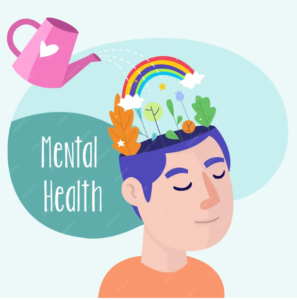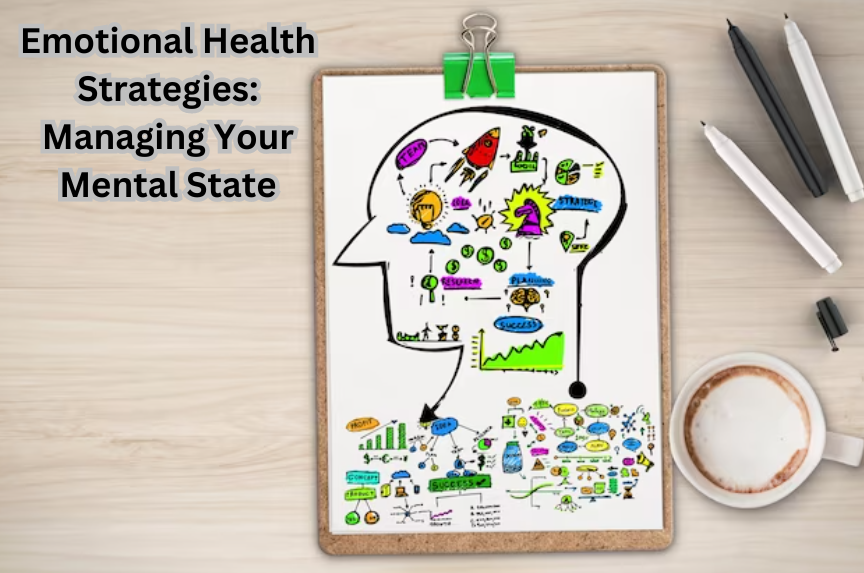Our mental health is the most important part of life’s beautiful dance. Welcome to “Emotional Health Strategies: Managing Your Mental State,” a book that will help you find your way through the maze of feelings and give you useful tips on how to keep your mind strong and in balance. Come with us as we unpack methods that will give you the power to direct your mental health.
How to Understand Emotional Health
The Most Important Part of Emotional Health
How to Read Emotional Health
Emotional health is more than just not having a mental illness; it also means being able to handle the ups and downs of life with strength. Understanding what it is all about is the key to making good plans.
Getting on board with emotional intelligence
It is very important to develop emotional intelligence. It means being able to recognize, understand, and control your feelings and understand and relate to other people’s emotions. This is a key part of having good mental health.
How to Develop a Strong Mindset
How to Think Positively
Using affirmations to help you feel better
Affirmations that are positive change the way we think. A positive attitude starts with affirmations that encourage positivity, self-compassion, and resilience.
How to Develop a Growth Mindset
Have a growth mindset. When you see problems as chances to learn and grow, you develop a strong attitude that protects your mental health from the effects of failures.

Techniques for Dealing with Stress
Putting self-care first
Your mental health needs to take care of yourself. Strategies like getting enough sleep, eating well, and doing things that help you relax can protect you from the bad effects of worry.
Mindfulness can help you deal with stress.
Mindfulness techniques should be a part of your daily life. Techniques like deep breathing and meditation can help you feel calm and in control, making worry disappear.
Taking care of relationships
Healthy ties with other people
Building relationships that help each other
Making and keeping meaningful relationships is good for your mental health. Grow bonds that give you support, understanding, and a sense of being a part of something.
Putting Limits On Things
Setting healthy limits for yourself is good for your mental health. Setting clear boundaries in partnerships keeps the give-and-take balance and keeps people from getting emotionally worn out.
Increasing Emotional Strength
Using coping skills
How to Find Your Coping Strategies
Figure out and improve your ways of dealing with it. Whether through creative expression, physical exercise, or getting help from a professional, coping techniques make people emotionally stronger.
Techniques for Controlling Your Emotions
Learn how to control your emotions well. Writing in a journal, deep breathing, and practicing mindfulness can help you handle strong feelings calmly.
Looking for Professional Help
Talk therapy and counseling
Getting mental health care back to normal
It is not a weakness to get help from a professional. Talking about therapy and counseling in a normal way lowers the shame surrounding them, which motivates people to put their mental health first.
Pros of Getting Professional Help
Therapists can help you take care of your mental health in many ways. Look into the benefits of therapy, such as learning more about yourself and coming up with ways to deal with the problems you face in life.
Getting Work and Life Together
Integrating work and life
Putting Work-Life Balance First
Keep your personal and work lives in balance. To avoid stress and improve general health, finding a balance in your life is important.
Having realistic goals is important.
Take care of people’s standards in both your home and professional life. Being realistic lowers your worry and lets you face problems with a calm and collected mind.

Conclusion: An All-Around Approach to Mental Health
Emotional health techniques are like threads that hold you together, keep you balanced, and make you feel good. You build a strong framework for emotional well-being by knowing what emotional health is all about, keeping a good attitude, dealing with stress, taking care of your relationships, and getting professional help when needed. This all-around method gives you the strength to handle your feelings gracefully. We are going to talk about the complicated world of emotional health. These tips will help you keep your mind in check and create an emotionally healthy life.
FAQ:
Reading our FAQ guide, “Emotional Health Strategies: Managing Your Mental State, ” is the first step to mental health.” As we answer your questions and give you useful advice, we will show you how to build strength, positivity, and balance in the complicated world of feelings. Come with us as we figure out effective ways to help you manage your emotional health and build a strong mental state.
What can you do to make your mental and emotional health better?
Practice being mindful:
Do more things that help you focus, like yoga, deep breathing, or walking with awareness. These activities raise understanding, lower stress, and improve mental and emotional health.
Build a Support System: Make friends and build connections that matter. Having helpful friends and family nearby is a great way to talk about your feelings, understand others, and get a new point of view.
Put self-care first: Make self-care habits a part of your daily life. For good mental and emotional health, you should get enough sleep, eat well, exercise regularly, and do things that make you happy.
Set limits: In both personal and business interactions, set healthy limits. Setting clear limits helps keep people from getting emotionally worn out and supports a healthy mind.
Learn How to Handle Stress Well: Writing in a journal, doing hobbies, or doing breathing routines are all good ways to deal with stress. Managing worry is important for keeping your mind and emotions in balance.
What does your mental health have to do with your emotional health?
A big part of mental health is emotional health. A good mental state helps you be strong, deal with problems, and keep your mind in check. On the other hand, having bad emotional health can cause worry, anxiety, and other mental health problems. A peaceful, dynamic environment positively affects mental health, behavior, and thinking.
How Can I Improve My Mental Health Through Self-Coping?
Positive Self-Talk: Train your mind to talk positively to itself. To keep a positive attitude, fight bad thoughts and replace them with statements.
Creative Expression: To show how you feel, use creative activities like writing, art, or singing. Expressing yourself creatively can help you deal with and let go of your feelings.
Mind-Body Practices: Do yoga and tai chi that connect your mind and body. These activities help you relax and feel good all around.
Get help from a professional. If you need to, think about therapy or coaching. Professional help can help you understand and control your feelings better.
How can you healthily handle your feelings?
Take note of and confirm:
Know and accept your feelings without judging them. The first step to good mental processing is to recognize how you feel.
Express Emotions: Find good ways to talk about your feelings. Getting some fresh air by talking to a friend, writing in a book, or doing physical exercise can help.
Think and Understand: Think about what makes you feel like you do. Figuring out the cause helps people healthily solve problems and grow emotionally.
Practice Emotional Regulation: Learn how to control your strong feelings. Deep breathing, visualizing, or doing exercises that help you feel grounded can help you manage your emotions.
Learn from Your Feelings: Your feelings can teach you a lot. Use them as signs to determine your wants, tastes, and growth areas. Emotional intelligence includes being able to learn from your feelings.

